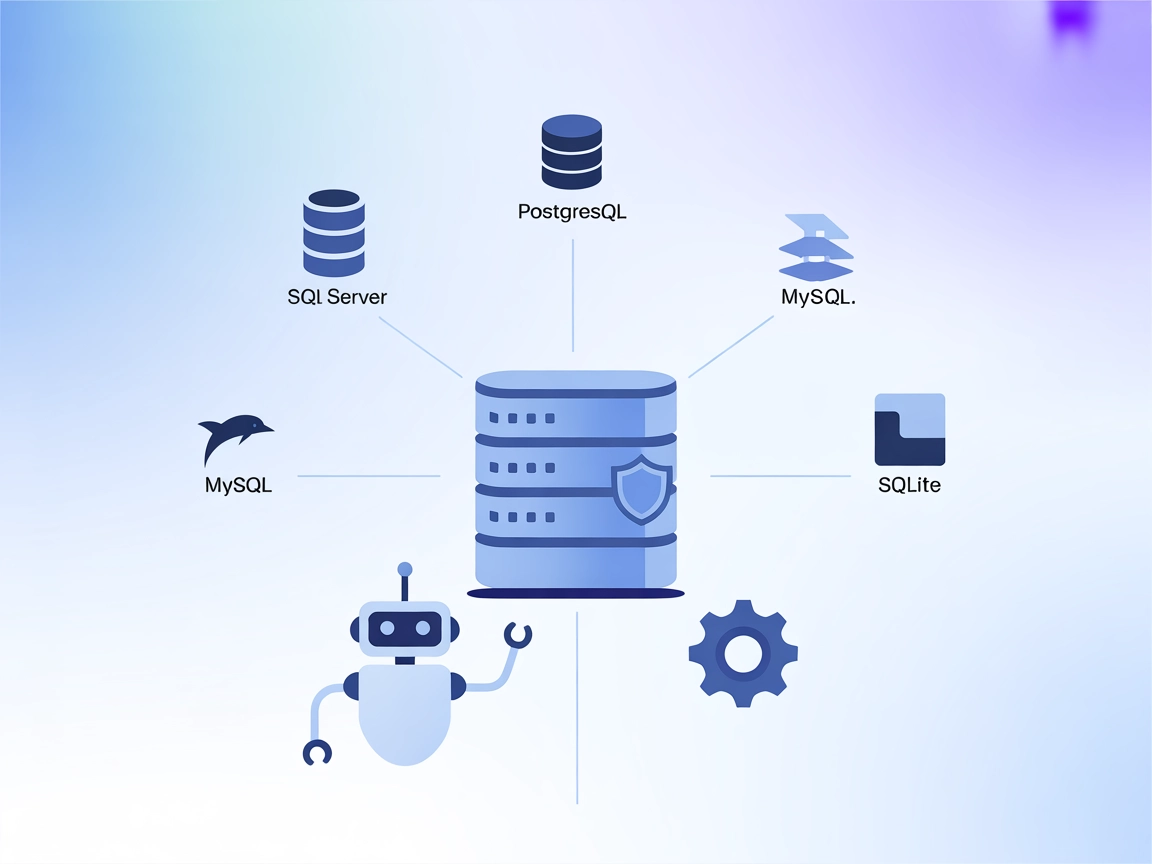
MSSQL MCP Server Integration
The MSSQL MCP Server enables secure, auditable, and structured interaction between FlowHunt and Microsoft SQL Server databases. It supports table listing, data ...

Bridge AI with Microsoft SQL Server for seamless data access, schema management, and business intelligence using the MSSQL MCP Server in FlowHunt.
FlowHunt provides an additional security layer between your internal systems and AI tools, giving you granular control over which tools are accessible from your MCP servers. MCP servers hosted in our infrastructure can be seamlessly integrated with FlowHunt's chatbot as well as popular AI platforms like ChatGPT, Claude, and various AI editors.
MSSQL MCP Server is a tool designed to bridge AI assistants with Microsoft SQL Server databases, enabling advanced database interaction and business intelligence directly from AI workflows. Through the Model Context Protocol (MCP), it facilitates seamless execution of SQL queries, business data analysis, and the generation of business insight memos. This server empowers AI agents and developers to perform tasks such as reading and writing database records, managing database schema, and extracting actionable insights, thereby streamlining database operations and automating business intelligence tasks. By connecting external data sources to AI assistants, MSSQL MCP Server significantly enhances development workflows and enables intelligent, context-aware automation in enterprise environments.
No prompt templates are explicitly mentioned in the repository or documentation.
No explicit MCP resources are listed in the repository’s documentation.
Prerequisites: Ensure Python 3.x is installed along with required packages (pyodbc, pydantic, mcp). Install with pip install -r requirements.txt.
Configure Database: Create a config.json file in the same directory as server.py with your SQL Server connection details (see config example below).
Edit Configuration: Add the following entry to your Windsurf (or Claude Desktop) config file:
{
"mcpServers": {
"mssql": {
"command": "python",
"args": [
"~/server.py"
]
}
}
}
Save and Restart: Save the configuration file and restart Windsurf.
Verify Setup: Ensure the MCP server is running and accessible from Windsurf.
Install Requirements: Ensure dependencies are installed as per requirements.txt.
Database Config: Create and fill out config.json as shown below.
Add MCP Server: In claude_desktop_config.json, add:
{
"mcpServers": {
"mssql": {
"command": "python",
"args": [
"~/server.py"
]
}
}
}
Restart Claude Desktop: Restart to load the new configuration.
Test Connection: Confirm connection to the MSSQL MCP server.
Install Dependencies: Use pip install -r requirements.txt.
Configure Database: Create config.json with your SQL Server settings.
Add MCP Server in Cursor: In the MCP configuration panel, add:
{
"mcpServers": {
"mssql": {
"command": "python",
"args": [
"~/server.py"
]
}
}
}
Save/Restart: Save changes and restart Cursor.
Verify: Confirm the MCP server is recognized in Cursor.
No explicit instructions provided for Cline. You may adapt the above process using the same JSON configuration method.
config.json for Database Connection{
"database": {
"driver": "ODBC Driver 17 for SQL Server",
"server": "server ip",
"database": "db name",
"username": "username",
"password": "password",
"trusted_connection": false
},
"server": {
"name": "mssql-manager",
"version": "0.1.0"
}
}
No explicit mention of API key handling or environment variable usage in the repository documentation. Make sure to set sensitive credentials (like username and password) via environment variables if supported by your deployment. Example placeholder:
{
"database": {
"username": "${MSSQL_USER}",
"password": "${MSSQL_PASS}"
}
}
Using MCP in FlowHunt
To integrate MCP servers into your FlowHunt workflow, start by adding the MCP component to your flow and connecting it to your AI agent:

Click on the MCP component to open the configuration panel. In the system MCP configuration section, insert your MCP server details using this JSON format:
{
"mssql": {
"transport": "streamable_http",
"url": "https://yourmcpserver.example/pathtothemcp/url"
}
}
Once configured, the AI agent is now able to use this MCP as a tool with access to all its functions and capabilities. Remember to change “mssql” to whatever the actual name of your MCP server is and replace the URL with your own MCP server URL.
| Section | Availability | Details/Notes |
|---|---|---|
| Overview | ✅ | MSSQL database-focused, business intelligence enabled |
| List of Prompts | ⛔ | No explicit prompt templates found |
| List of Resources | ⛔ | No explicit MCP resources listed |
| List of Tools | ✅ | read_query, write_query, create_table, etc. |
| Securing API Keys | ⛔ | No explicit API key/env var instructions |
| Sampling Support (less important in evaluation) | ⛔ | Not mentioned |
MSSQL MCP Server provides a solid suite of database tools and example configurations for major platforms, but lacks explicit MCP prompt/resource definitions and security/env var guidance. It is highly useful for SQL Server automation, but would benefit from richer documentation and security best practices.
Rating: 6/10 — Good core functionality and open source, but missing some advanced MCP features and documentation depth.
| Has a LICENSE | ✅ MIT |
|---|---|
| Has at least one tool | ✅ |
| Number of Forks | 8 |
| Number of Stars | 31 |
It is a tool that connects AI assistants with Microsoft SQL Server databases through the Model Context Protocol, allowing automated data access, schema management, and business intelligence directly from AI workflows.
You can read, write, and manage database records, create tables, list and describe tables, and generate business insight memos—all from within your AI-powered flows.
While there’s no explicit API key or environment variable support in the documentation, it’s recommended to use environment variables for sensitive information. For example, in your config: "username": "${MSSQL_USER}", "password": "${MSSQL_PASS}".
Example setup instructions are provided for Windsurf, Claude, and Cursor. Cline is not explicitly documented, but can use a similar configuration process.
No explicit prompt templates or custom MCP resources are described in the documentation. Operations are performed via the listed tools.
The server has an MIT license, 8 forks, and 31 stars as of the latest snapshot.
Unlock advanced business data analysis and automate database operations by integrating the MSSQL MCP Server into your FlowHunt workflows.

The MSSQL MCP Server enables secure, auditable, and structured interaction between FlowHunt and Microsoft SQL Server databases. It supports table listing, data ...

The MCP Database Server enables secure, programmatic access to popular databases like SQLite, SQL Server, PostgreSQL, and MySQL for AI assistants and automation...

The py-mcp-mssql MCP Server provides a secure and efficient bridge for AI agents to interact programmatically with Microsoft SQL Server databases via the Model ...
Cookie Consent
We use cookies to enhance your browsing experience and analyze our traffic. See our privacy policy.